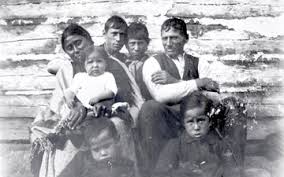To what extent should contemporary society respond to the legacies of historical globalization? Part B
To what extent should contemporary society respond to the legacies of historical globalization?
Impacts
What were the impacts of historical globalization on the identity and citizenship of the Indigenous and non-Indigenous peoples?
The Haudenosaunee world view teaches that the actions and decisions of the past have consequences for generations of the future. Careful consideration was encouraged when Elders and chiefs were faced with making decisions. European world views tended to base decisions on immediate results or in response to possible issues in the immediate future. Little consideration was given to how actions would affect the people seven generations later.
Read
Samuel de Champlain encouraged the intermarriage between French men and First Nations women. Read the following "Champlain: The Marriage of Two Cultures" below;
Click HERE to read.
Reflection
In what ways has the intermarriage of two cultures shaped issues of identity generations later?

Continue your examination of the legacies of historical globalization by looking at the relationship between historical globalization and identity and citizenship in Canada.
Backgrounder to Early Canadian Identity and Citizenship
Colonial recruitment of settlers to Canada intentionally selected people from Europe and the United States who were of non-Aboriginal background. The early franchisement of Canadians was restricted to land-owning men of European background. Imperialist policies and practices favoured bestowing citizenship on this group. The domination of the British through imperialist policies led to a position of power for this group.
Understandings of Canadian identity and citizenship in the following generations continued to benefit those of European heritage. Women and men of non-European heritage mainly carried out the battles for the franchise and rights in Canada. Recognition of a place in Canadian society is no longer a key issue for many Canadians whose ancestors gained identity and citizenship in the early history of Canada.
Timeline of the Vote in Canada
1848 – Nova Scotia is the first to elect a responsible government. The voters are men of European background who hold property and pay taxes.
1850s – Slaves freed from the United States are granted freedoms, such as the vote and the right to run for office.
1867 – The British North America Act continues the tradition of providing the right to vote to the same group. Women and Aboriginal groups continue to be excluded. Men from Asia are also part of this exclusion.
1918 – Women whose husbands, fathers, or brothers who served or are serving overseas in the Great War are granted the right to vote. This franchise is only granted to women who are Canadian citizens. Aboriginal and Asian women are excluded. Aboriginal men can only gain the franchise if they give up their Indian status.
1920 – To be able to vote, a Canadian has to be a British citizen at least 21 years old.
1947 to 1948 – Chinese, Indo, and Japanese Canadians gain the right to vote.
1960 – Universal franchise (right to vote) is granted to Aboriginal peoples in Canada without having to give up Indian status.
Reflection
Discuss how identity and citizenship of non-Aboriginal peoples in Canada were granted. Use information from the backgrounder to support your discussion.